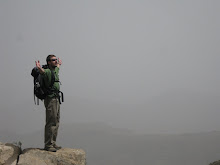Hello again and apologies for my absence. Internet in Ethiopia is reputed to be among the worst not only in sub-Saharan Africa, but in the entire world, with some estimating Internet infrastructure as the fourth worst in the world. Government monopoly over the Internet market and a draconian system of domestic restrictions have together produced one of the least connected countries on the planet. Even to access unreliable Internet requires a commute across town to one of few western hotels in the city where I’m able to hang out and briefly connect with the outside world. So posts will be few and far between, but I’ll do my best to keep the blog updated.
I spent most of this week on-site at the Korah Group, learning more about the business in its current state, and forming a plan of action for moving more goods to market here in Addis. Spending all day in Korah can be an exhausting routine – every afternoon I return to the house both physically and emotionally drained. Conditions in Korah are abysmal, and society and the government have long since given up on the area. The Korah neighborhood was originally given its name because of the widespread perception that the people there were cursed, much like the two biblical villains to whom Korah refers in the original Hebrew. Korah’s etymological roots have only reinforced this sense of stigmatization and societal rejection.
When the leper colony was initially established, King Haile Selassie gave land far away from the city center, far removed from Addis. Under the Communist Dergue, soldiers massacred those afflicted with leprosy, believing society to be better off without the leprous population. These mentalities persist today, reflecting societal and governmental attitudes toward leprosy, and as a result Korah is effectively isolated, both literally and figuratively, from city life. Information on Korah is sparse, but helpkorah.com is a helpful resource for those interested on reading more about the area.
Although the needs here are perhaps greater than anywhere else in Ethiopia, even foreign NGOs and doctors have failed to penetrate the impoverished slum, creating a dire humanitarian situation. The fact that the national government, the central governing apparatus of which is located in the same city only kilometers away, has essentially ignored Korah can be exasperating and even depressing. Every day I make a long walk into the neighborhood, after taking public transportation as close as it goes to Korah, and this lengthy walking commute provides a daily reflection of the fundamental apathy espoused by the government.
These attitudes create the perception among those living in Korah that they are an unwanted population, forsaken by society and by the government. Initially people were pretty skeptical of me, a white kid walking through this place where outsiders seldom venture, but as they get used to seeing me on a daily basis they’re warming up to me. Every afternoon, I walk around and explore the area, and some days I end up joining a soccer game with some local kids, hopefully buttressing my image as a non-threatening foreigner.
Despite the aforementioned humanitarian and stigma obstacles, the people of Korah are resilient, and I anticipate learning much from them over the coming months. Over the course of my stay here, I plan to establish relationships between the Korah Group and retailers throughout the city, providing a starting point for economic regeneration of the business.
Power outages here are common, and the daily blackout just struck, limiting my battery power, so I’m out. As always, thanks for reading, and stay tuned for more updates as Internet permits.
Saturday, June 5, 2010
Subscribe to:
Post Comments (Atom)


0 comments:
Post a Comment
Note: Only a member of this blog may post a comment.